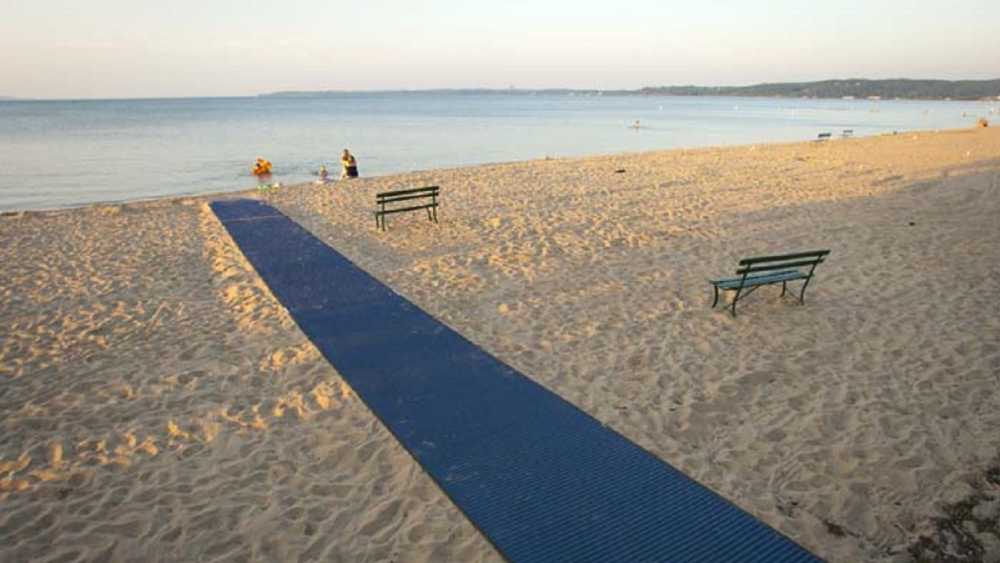Accessibility in Michigan State Parks
The Mitten State is going above and beyond in inclusive outdoor exploration.

Whether you envision cruising along sandy shores or winding through forest trails, Michigan’s famous outdoor spaces are becoming more inclusive to visitors with disabilities thanks to the efforts from Michigan’s Department of Natural Resources (DNR) and its Accessibility Advisory Council.
Hit the Trails with a Track Chair
In 2023, the DNR reached its fundraising goal of over $400,000 to expand access to track chairs at state parks, beaches and trails. Track chairs are all-terrain, electric wheelchairs that can handle rugged terrain and up to 8 inches of water. These are an integral resource for visitors navigating the diverse landscapes of state parks, and Michigan now proudly boasts the most track chairs for public use in any state park system. For example, at Ludington State Park guests can cruise along the beach near the Big Sable River in a track chair. At Maybury State Park, outdoor enthusiasts can use the chairs along 26 miles of trails crossing through winding meadows and scenic forests.
“It has been wonderful to see the track chair program grow from five to 25 locations in just a few short years. The support we have received from donors and users speaks for itself,” said Michelle O’Kelly, Track Chair Program Coordinator with the Michigan DNR. “Having the ability for visitors to access beaches and trails with their friends and families has been incredibly rewarding. We hear stories about how this is the first time visitors have been able to enjoy the sun, sand, picnics and hiking as a family.”
Relax Along Michigan’s Beaches

Not to be overlooked, Michigan’s pristine freshwater coastline is also becoming increasingly more accessible to visitors with mobility disabilities. To experience a day on the lakeside, guests can ask about specially crafted beach wheelchairs at several publicly managed shorelines – light, all-terrain chairs designed to easily navigate sandy and wet terrain. Plus, many parks offer accessible walkways, boardwalks or beach mats to make the journey even smoother. Head over to Otsego Lake State Park for a universally accessible beach and swim area featuring a boardwalk and beach wheelchair. Seven Lakes State Park also offers a stab-mat that provides wheelchair access to the water.
Accessible recreation opportunities don’t just allow visitors to take in the scenery; they allow them to be a part of the action. Rifle River Recreation Area is home to an accessible hunting blind. It is insulated and offers six feet of space to maneuver. The blind is solar-powered and can be raised 20 feet in the air. In the off-season, it is used for wildlife observation and photography.
Splash Around in a Waterfall
Michigan has rightfully earned the title of “Water-Winter Wonderland.'' But the Great Lakes aren’t the only breathtaking bodies of water. The Lower Peninsula is home to Ocqueoc Falls – the only universally accessible waterfall in the United States, meaning it exceeds the requirements of the Americans with Disability Act (ADA). It features an accessible ramp leading to the water with a transfer station, allowing wheelchair users to enter the water, and an accessible picnic and seating area. Everyone can enjoy the beauty of Ocqueoc Falls.
“I have been to Ocqueoc Falls. It's 45 minutes from where I grew up in Cheboygan. I have experienced getting down to the falls and right next to the falls with my nieces and nephews. It was great! I have kids of my own and hope to bring them there to show them as well. Heck, I might even go in the water,” shared Bryan Wilkinson, Accessibility Advisor Co-Chair and owner of Michigan Track Chair. “It is imperative to continue and create new initiatives for accessibility across Michigan.”
The DNR’s commitment to inclusivity across its parks and recreation areas allows everyone to enjoy a quintessential part of the Great Lakes State. Click here for more information on accessibility in Michigan’s state parks.
About the Author: Charlotte Bachelor is a Detroit-based writer and disability advocate. She is the founder of the Detroit Accessibility Project and has contributed to both Visit Detroit and Pure Michigan.